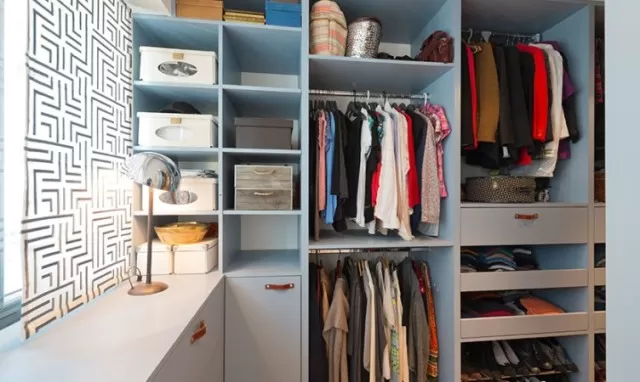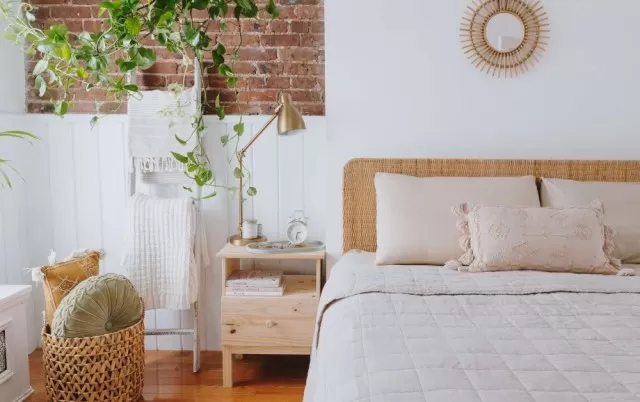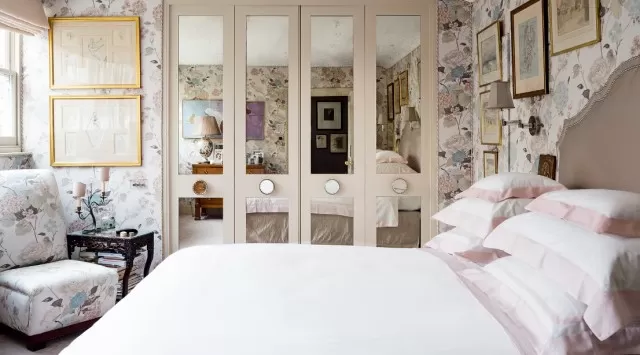The concept of getting organized can elicit different responses from individuals. Some may view it as a necessary task to be done quickly.
While others may perceive it as an overwhelming challenge.
However, organizing goes beyond simply arranging physical belongings—it has the power to enhance confidence, bring fulfillment, and cultivate a positive mindset, which is especially valuable in today’s world.
When everything in your home has its designated place, everyday problems become easier to solve.
Even something as small as knowing where to find fresh batteries for remote control can bring a sense of control and satisfaction. By having systems in place, you gain the confidence of knowing exactly where to look and how to resolve minor inconveniences.
To help you experience the mental health benefits that come with an organized home, Carrie Peeples, the owner of Neatsmart, a home organization company in Atlanta, shares her invaluable secrets to help you get organized and regain control of your space.
Why should you organize your room?

Having an organized room offers numerous benefits beyond just achieving inner peace.
When your living space is cluttered and disorganized, it can harm your daily life. Here are some reasons why organizing your room is important:
Time-saving: A well-organized room saves you valuable time.
With everything in its designated place, you can easily find what you need when you need it. No more rummaging through drawers or searching through piles of clutter.
This efficiency allows you to focus on more important tasks and enjoy a stress-free environment.
Increased productivity: An organized room creates a conducive environment for productivity.
When your space is clear and free from distractions, you can concentrate better on your work or studies. A clutter-free room promotes a clear mind and enhances your ability to stay focused and accomplish your goals.
Reduced stress: Living in a cluttered environment can lead to increased stress levels.
The constant visual reminder of unfinished tasks and the feeling of being overwhelmed by the mess can contribute to feelings of anxiety and unease. On the other hand, an organized room creates a sense of calm and promotes relaxation, allowing you to unwind and recharge.
Improved well-being: A clean and organized room can have a positive impact on your overall well-being.
It creates a visually appealing and harmonious space that can uplift your mood and contribute to a sense of harmony. Additionally, an organized room reduces the chances of accidents or injuries caused by tripping over clutter or misplaced items.
Enhanced creativity: Clutter can stifle creativity and hinder inspiration.
By organizing your room, you create an environment that fosters creativity and encourages innovative thinking. A well-organized space provides clarity of thought and allows your mind to wander freely, leading to increased creativity and productivity.
Better sleep quality: Your bedroom is meant to be a sanctuary for relaxation and restful sleep.
A cluttered and disorganized room can disrupt your sleep patterns and make it difficult to unwind before bed. By organizing your room and creating a peaceful atmosphere, you can improve the quality of your sleep and wake up feeling refreshed and rejuvenated.
Remember, organizing your room is not a one-time task but an ongoing process.
Maintaining an organized space requires consistent effort and a commitment to declutter regularly. By prioritizing organization, you can transform your room into a functional, inviting, and stress-free haven that positively impacts various aspects of your life.
Guide to Get Organized Now

Embrace Progress and Self-Compassion.
Learning to be organized is a skill that can be acquired, even if it doesn’t come naturally to you.
It’s common to feel overwhelmed and unsure of where to start when faced with clutter. Instead of letting fear paralyze you, take it slow and be gentle with yourself throughout the process.
Don’t feel anxious about it; give yourself some grace, as suggested by Peeples. Additionally, decluttering can evoke feelings of shame and guilt, especially when we attach emotional value to our possessions.
It’s important to recognize that letting go of certain items doesn’t diminish their significance or the memories associated with them. If something no longer suits you or has lost its purpose, consider donating or consigning it to give it a chance at a new life.
Establish a Structured Routine.
Even though our schedules may have changed recently, having a sense of structure in our daily lives is beneficial.
Humans naturally seek a feeling of accomplishment, and organizing our surroundings can contribute to that. By setting a schedule and following a step-by-step plan, you can boost your productivity and regain a sense of control.
Remember that your plan doesn’t have to be rigid or overly detailed; it simply serves as A Guide to help you stay on track and feel more organized throughout the day.
Dedicate 15 Minutes Each Day.
Conquering a disorganized home doesn’t have to be a daunting task.
Break it down into smaller, manageable projects that can be completed in just 15 minutes each day. By focusing on one short task at a time, you’ll experience a sense of accomplishment that can motivate you to tackle more projects in the future.
These tasks can be as simple as sorting mail, organizing a specific drawer, decluttering a cabinet, or cleaning a particular area of your home, such as a sink or countertop.

Divide Larger Projects into Sections.
To avoid feeling overwhelmed by larger organizing projects, start small and break them down into sections.
For example, if you want to organize your kitchen, begin with cleaning out your pantry. Focus on removing expired items or donating those you won’t use, and then move on to arranging similar items together on separate shelves.
Similarly, when organizing your closet, consider your current lifestyle and let go of items that no longer reflect who you are today. Don’t hold onto things based on future aspirations, but instead, celebrate your present self and make room for items that truly bring you joy.
Involve the Kids.
Teaching children the importance of organization from an early age can have a lasting impact.
Encourage kids to participate in tidying up by making it a fun and interactive activity. By involving them, you’ll not only let go of the pressure for everything to be perfect but also appreciate their efforts and value their input.
The more creatively they can engage with organizing tasks, the more willing they’ll be to participate.
Donate or Sell Unwanted Items.
Once you’ve decluttered and organized your belongings, it’s time to part ways with the items you no longer need.
Start by offering them to friends or family members who may be interested. Pay extra attention to family heirlooms, as they may hold sentimental value for your loved ones.
Another option is to donate to a charity that resonates with you, knowing that your unwanted items will benefit someone in need. If you prefer to sell your items, consider online platforms such as Facebook Marketplace, and Craigslist, or specialized consignment websites like Poshmark, ThredUp, or TheRealReal for luxury items.
Remember, the goal of organizing is to create a functional home that reflects your unique style and meets your needs.
Take the opportunity to reassess your belongings seasonally, evaluating what you truly use and what no longer serves a purpose. Start small and pace yourself, recognizing that organizing is a journey rather than a one-day task.
*The information is for reference only.